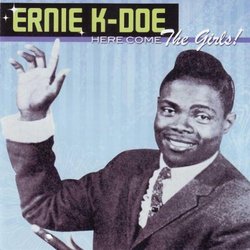A Lost Soul Classic!
Jeff Mason | Boulder, Colorado USA | 03/29/2008
(5 out of 5 stars)
"Don't let the cheesy cover fool you, this is a fantastic disc! The bulk of the disc (the first ten tracks) comprises Ernie K-Doe's solo "comeback" session from 1970 released on Janus Records in 1971. The sessions were entirely produced by New Orleans' songwriting and producing legend Allen Toussaint, and eight of the ten cuts (all but "Kiss Tomorrow Goodbye and "Talkin' `Bout This Woman) were written by Allen as well.
In my opinion, Allen was at a songwriting peak in 1970, having written the bulk of the tracks for Lee Dorsey on his "Yes We Can" LP (which is considered by many to be one of the greatest soul LPs of all time). These K-Doe tracks were written and recorded at the exact same time, and to me, they are equally as good as those found on the Dorsey LP. Stylistically, the music on "Here Come The Girls" is very much in the same vein as the material found on Dorsey's "Yes We Can" Yes We Can/Night People. In fact, "A Place Where We Can Be Free" (released as an outtake from the "Yes We Can" sessions on Polygram's Yes We Can and Then Some CD) is the exact same backing track with K-Doe's vocals substituted for Dorsey's! Why Lee's album met with success but Ernie's comeback was halted in its tracks is beyond me. Perhaps Janus, as a smaller label, didn't have as much money to promote the record. In any case, this deserves to be labeled as one of the great "lost" soul LPs.
Oh, and did I forget to mention that the legendary Meters play on the bulk of the tracks? There is some serious FUNK to be found on this record. The opening "Here Come The Girls", "Backstreet Lover", "Whoever's Thrillin' You Is Killin' Me" (later a hit for Rufus) "Fly Away With Me" and "Lawdy Mama" surely feature The Meters as their backing vocals (if nothing else) are so distinctive. Each deserved to be a hit in their own right. "Kiss Tomorrow Goodbye", "Long Way Back Home" and "Talkin' `Bout That Woman" are more standard soul ballads (the latter two are particularly excellent) and "A Place Where We Can Be Free" is an uptempo, optimistic number in the vein of "Yes We Can".
As a bonus they've included the A and B side of Ernie's first 45 recorded for Toussaint and Marshall Sehorn's Sansu label in the early 70s, as well as a fast outtake version of Ernie's classic "Mother In Law" (which, while interesting, would be more suited on a collection of Ernie's 60s material for the Minit and Instant labels Absolutely the Best, The R&B Kings of New Orleans: The Best of Ernie K-Doe & Chris Kenner).
As for the disc itself, I have to tip my hat to Great American Music for finally putting this out on CD. The cuts appear to be from original tapes (not vinyl transfers), which is a plus. The bonus tracks are a nice addition. The only downside about the transfer I noticed is that some of the songs begin to fade out, then "stop dead" before the natural fade has finished. You would probably only notice if you were listening with headphones, but it is a bit disappointing in that this could have easily been avoided. A generous collector supplied me with a dub of his copy of the original vinyl LP and I can tell you the fades do not cut off like that on the original record. Another minor quibble is the "cheesy cover" I referenced at the beginning of my review. First, it uses a stock photo of Ernie from the early 60s with kind of a "loungy" 60s background to it. Call me a purist, but utilizing the original LP artwork or locating a photo of Ernie from the 70s (such as the one found on the back of the original LP) would have been better and would have told prospective buyers, at a glance, that this was 70s Ernie K-Doe, not another re-issue of his classic early 60s material. Also, while Bill Dahl's liner notes are well written and informative, they focus mainly on Ernie's early beginnings and his time at Minit in the early 60s. I'd have liked to have seen more on the actual 1970 sessions written. Also, there are no session notes for the tracks AT ALL. For the fan, it would have been nice to know when each track was recorded and who the session musicians for each track were. These minor quibbles aside, I'm overjoyed that this has seen the light of day on CD and I would encourage fans of K-Doe, Toussaint or of the "Yes We Can" LP to pick up a copy of this one; you won't regret it.
Oh, and lastly, I suppose we should thank the Boots drugstore chain in the UK for using "Here Comes The Girls" so cleverly in their Christmas 2007 ad campaign. I'm sure renewed interest in this song helped get this CD released."


 Track Listings (13) - Disc #1
Track Listings (13) - Disc #1